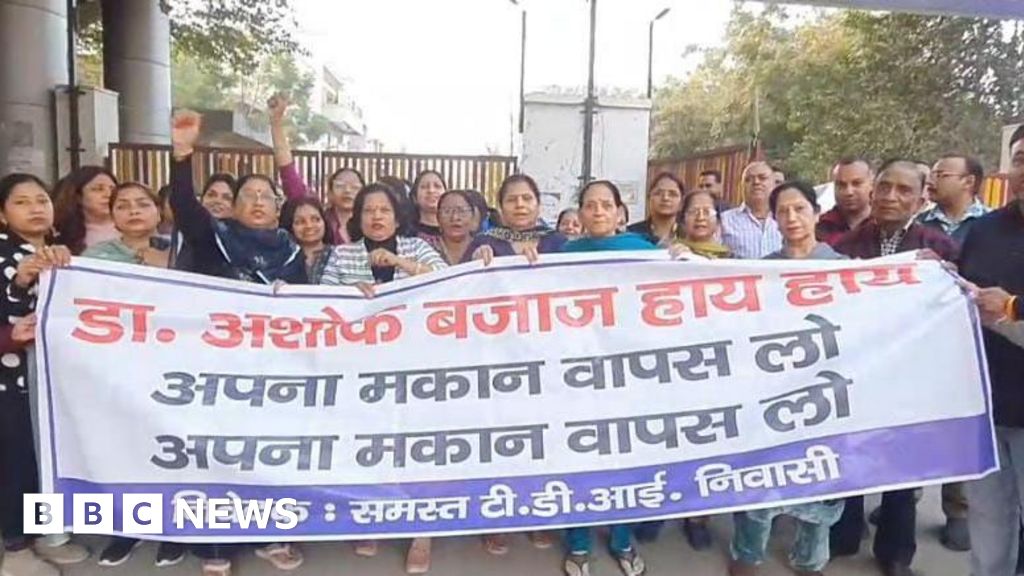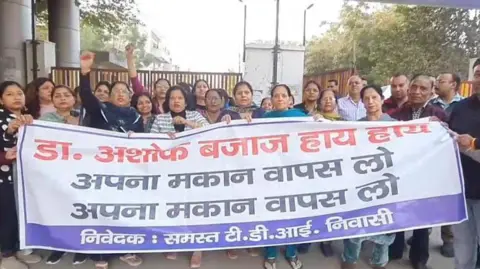 Anoop Mishra
Anoop MishraA Muslim couple in India have been hounded out of their newly-purchased home by their Hindu neighbours who said they would not allow them to live there because of their religion.
Hindu residents of the posh TDI City – an upscale residential bloc in the northern city of Moradabad – began protesting on Tuesday night after news of the sale became public.
A video from the protest that has gone viral shows one of the residents Megha Arora saying that Dr Ashok Bajaj, a resident, had sold his house to a Muslim family without consulting them.
“We cannot tolerate a Muslim family living right in front of our local temple. This is also a question of the safety of our women,” she said.
“We want the sale to be revoked and are asking the administration to cancel the registration of the house in the name of its new owners. We cannot allow people from another faith to come and live here. We will not allow them to enter and continue to protest as long as they don’t go away,” she added.
Many of the residents also visited the district magistrate’s office to lodge a complaint. Outside, they shouted slogans against Dr Bajaj and the Muslim couple.
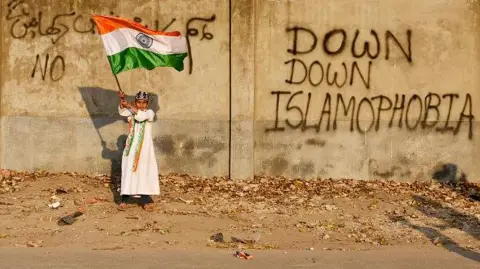 Getty Images
Getty ImagesThe protests have had their intended effect. On Friday, Dr Bajaj told the BBC that a resolution, mediated by the city’s elected representative, had been reached and the new Muslim owners would re-sell the house to a Hindu family already living in the housing society.
Dr Bajaj, who runs an eye hospital in the city and had lived in the society for more than six years, said he had sold the house to the Muslim couple who are both doctors and that their families had known each other for 40 years. The Muslim couple, he said, were no longer comfortable moving into the house.
He added that the furore over the sale was “uncalled for” and that he had not expected it to become national news.
The protest started after he introduced the Muslim couple to his neighbours as a gesture of goodwill.
The backlash to the sale of the house, he said, “has come out of nowhere” as there are other Muslim families already living in the colony and that “we had always had a good rapport with our neighbours”.
“The controversy is changing the fabric of the city. Our intention was not to create any kind of unrest with this transaction,” he said, adding that “there is no law” against this transaction.
The colony also did not have a residents’ association that would need to approve the sale, he said. “Now they have woken up to make it.”
This is not the first time Muslim residents have faced backlash in Moradabad for buying homes in a Hindu-majority area. In 2021, residents and Hindu hardline organisations had protested after two Muslim families had purchased houses from Hindus.
Segregated living has existed in rural India for a long time where different castes and religions lived apart. The urban centres were meant to be the melting pots where people could live together, irrespective of their differences. However, in reality, many urban areas continue to experience segregation.
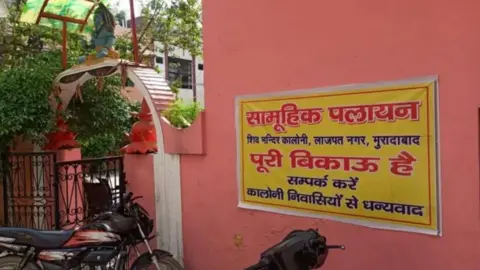 Shahbaz Anwar
Shahbaz AnwarDiscrimination against minority communities, especially Muslims, is common in many Indian cities where many housing societies insist on food habits such as vegetarianism to keep them out.
Muslims in states like Gujarat and Maharashtra have often said they are unable to buy or rent homes in Hindu neighbourhoods. A few years ago, a Bollywood actor Emraan Hashmi had made headlines for alleging he was refused a flat in Mumbai because of his Muslim faith.
Tanvir Aeijaz, professor of politics and public policy at Delhi University, says denying the Muslim couple the choice to buy the house they wanted is “discriminatory and completely unconstitutional”.
“It’s a violation of their fundamental and legal rights. This is a violation of a person’s right to equality and freedom and if such cases increase, they endanger the constitution of India.”
Prof Aeijaz says there are special rights to protect Dalits (formerly known as untouchables) and women who are considered vulnerable groups, “but how come there are no rights to protect Muslims who are the most vulnerable group in India”? he asks.
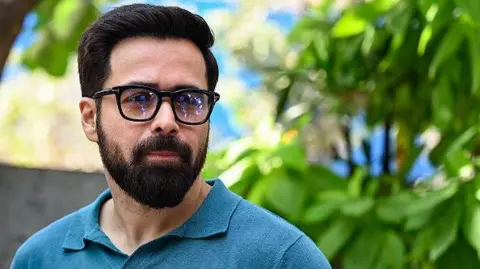 Getty Images
Getty ImagesThis incident has also resulted in a huge outrage in India with many taking to social media to express their anger.
“Welcome to #NewIndia,” comedian Akash Banerjee wrote on X, formerly Twitter. “A doctor sold his house to a fellow doctor… Why on earth would that lead to a massive protest/uproar in a posh housing society in Moradabad?” he asked.
“As a nation we always boast about unity in diversity. We should be ashamed about these incidents,” wrote John Brittas, an MP from the Communist Party of India (Marxist).
Those protesting against the couple “were not nameless, faceless individuals”, another user wrote on X. “They were people unafraid and unashamed of publicly displaying their bigotry and lsIamophobia.”
Critics say incidents of violence and discrimination against India’s Muslim community have grown in the past decade under the Hindu nationalist government of Prime Minister Narendra Modi. Anti-Muslim hate speech incidents have surged, with a majority reported from states ruled by the BJP – Moradabad is also located in the BJP-ruled Uttar Pradesh. The BJP has consistently denied these claims.
Prof Aeijaz says the incident in Moradabad “shows that religious polarisation has sunk in, that it’s working at the ground level”.
But, he says he feels hopeful that things will change for the better.
“Hinduism is based on pluralism. Most people I meet understand that hate is against their religion. And that gives me hope.”
Follow BBC News India on Instagram, YouTube, Twitter and Facebook.
